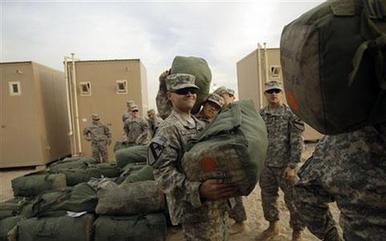
This is IN THE NEWS in VOA Special English.
This week, the war in Iraq officially ended.
American troops lowered their command's flag on Thursday in a ceremonial close to nearly nine years of conflict. Defense Secretary Leon Panetta spoke at the ceremony at a heavily protected area of an airport in Baghdad.
LEON PANETTA: "To be sure, the cost was high -- the blood and treasure of the United States and also for the Iraqi people. But those lives have not been lost in vain. They gave birth to an independent, free and sovereign Iraq."
Tens of thousands of Iraqis died in the military campaign known as Operation New Dawn. So did more than 4,000 Americans. The American-led invasion quickly ousted Iraqi ruler Saddam Hussein. But violence between competing groups grew and pushed Iraq toward civil war. The violence has decreased sharply. But insurgents, some of them operating with Iranian support, continue attacks.
Some American officials wanted to keep several thousand troops in Iraq after December 31st. The two countries agreed to that withdrawal date three years ago, when George W. Bush was still president. But the Obama administration failed to reach an agreement with Iraq on legal protection for American troops. A small number of troops will remain, mainly to protect diplomats.
This week, some Iraqis celebrated the withdrawal of American troops. Others expressed worry, including Mohhamed Abbad Hussein, who is recovering from a bomb explosion.
ABBAD HUSSEIN (IN ARABIC): "It's never going to end. People are going to continue to suffer. As long as there is a political crisis, it's never going to end."
Murtadha Homadi, a guard with a local security company, had mixed feelings about the war.
MURTADHA HOMADI (IN ARABIC): "We were really happy that Saddam Hussein fell. But, after that, many bad things happened, especially when al-Qaida started setting off bomb."
Eleven-year-old Gohfran Yassir of Baghdad says she is always afraid.
GOHFRAN YASSIR: "I am scared that a bomb will go off, explosions and we will die, or we will be kidnapped or killed."
Many Iraqis worry that their country will fail if it is controlled only by politicians and religious militias. Human rights activist Sundus Abass says Iraq's future may depend more on the will of its people.
SUNDUS ABASS: "I am like other Iraqis, I am worried about this. Because there is no, nothing who can tell us that it will be fine after the Americans troops withdraw from Iraq. I think yes there will be more violence in Iraq."
The invasion took place in March of 2003. Soldiers from Fort Bragg, North Carolina, were among the first to enter Iraq. They also helped lead the troop increase in 2007. This week, President Obama visited Fort Bragg to thank returning troops.
BARACK OBAMA: "So as your commander in chief, and on behalf of a grateful nation, I am proud to finally say these two words, and I know your families agree: Welcome home. [Cheers] "
Mr Obama spoke of the sacrifices made by service members.
BARACK OBAMA: "More than 1.5 million Americans have served in Iraq -- 1.5 million. Over 30,000 Americans have been wounded. Those are only the wounds that show. Nearly 4,500 Americans made the ultimate sacrifice."
The president called the results of the war "an extraordinary achievement."
BARACK OBAMA: "Iraq is not a perfect place. It has many challenges ahead. But we are leaving behind a sovereign, stable and self-reliant Iraq, with a representative government that was elected by its people."
And that's IN THE NEWS in VOA Special English. I'm Steve Ember.
Latest Billy Ray Cyrus album salutes US troops
Dozens killed as wave of violence strikes Iraq
(來(lái)源:VOA 編輯:Rosy)
